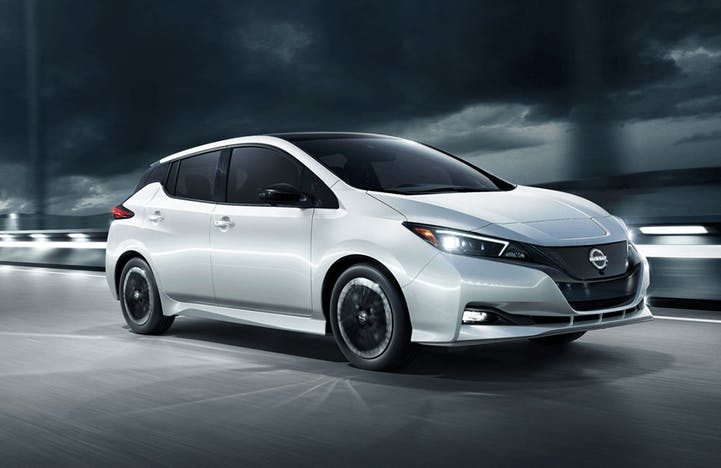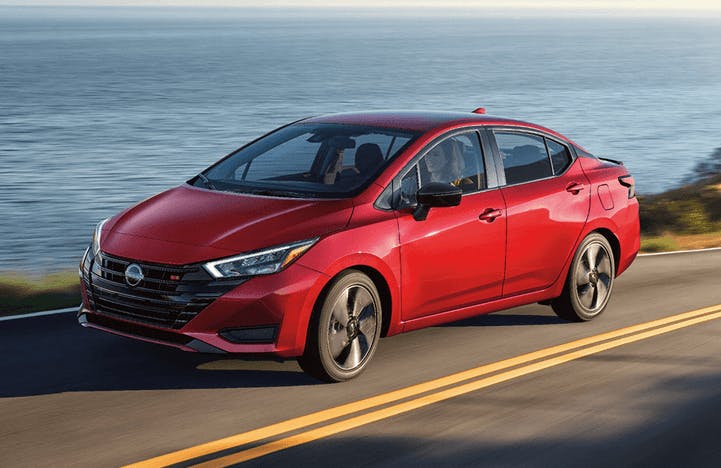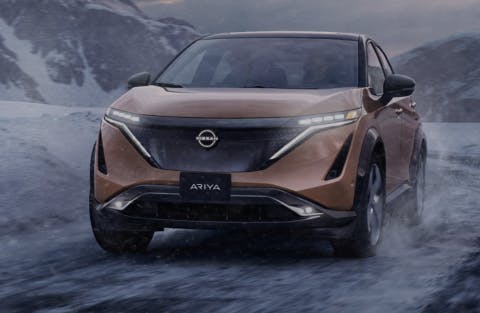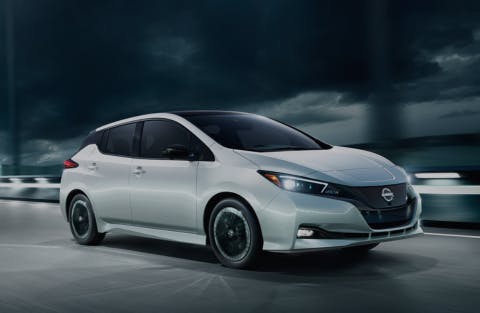Nissan EVs don’t just drive, they spark your imagination,
and take your breath away.

When people discuss electric vehicles, they’re typically referring to Battery-Electric Vehicles (BEVs), which are powered exclusively by electricity. EVs use a large battery pack that supplies energy to an electric motor (or motors) to power the vehicle.1

An internal combustion engine vehicle is an automobile powered by conventional, oil-derived resources such as gasoline or diesel fuel.
An ICE vehicle lifts the fuel inside the cylinder with the help of a spark plug and pushes the piston. The piston then rotates the crankshaft. Unlike gas-powered vehicles, electric vehicles do not require internal combustion engines to operate.1 They are outfitted with an electric motor (or motors) and a rechargeable battery.
Since EVs may be more expensive to buy and repair, insurance rates may be higher. That said, the potential savings on gas and tax incentives may offset the extra cost.3
EVs may require less frequent ongoing maintenance and may have lower routine maintenance costs than ICE vehicles. This is because all-electric motors have fewer moving parts than ICE engines, and they require fewer fluids, such as engine oil, that require regular monitoring and replenishing. Because EVs use regenerative braking, typically brake wear is also reduced.
With an EV, you won’t need to fill up your tank at the gas station, but you will need to charge your vehicle, which may increase your electric bill if you charge at home. When you charge, where you live, and what type of charger you use are all factors that will affect your electric bill. Electricity costs can vary significantly by region.1,2
Nissan Electric Vehicles - Built to Thrill
Nissan ARIYA
With the performance of a sports car, the versatility of an SUV, and the breakthrough technology of e-4ORCE all-wheel-drive, the Nissan ARIYA is more than an EV, it’s truly a force of wonder.


Nissan LEAF
Discover the instant acceleration, incredible range, and nimble handling of the all-electric Nissan LEAF – the world’s first mass-produced 100% electric car.

| Monday | 9:00 AM - 8:00 PM |
| Tuesday | 9:00 AM - 8:00 PM |
| Wednesday | 9:00 AM - 8:00 PM |
| Thursday | 9:00 AM - 8:00 PM |
| Friday | 9:00 AM - 8:00 PM |
| Saturday | 9:00 AM - 7:00 PM |
| Sunday | 11:00 AM - 4:00 PM |
| Monday | 7:30 AM - 5:30 PM |
| Tuesday | 7:30 AM - 5:30 PM |
| Wednesday | 7:30 AM - 5:30 PM |
| Thursday | 7:30 AM - 5:30 PM |
| Friday | 7:30 AM - 5:30 PM |
| Saturday | 8:00 AM - 3:00 PM |
| Sunday | Closed |
| Monday | 7:30 AM - 5:00 PM |
| Tuesday | 7:30 AM - 5:00 PM |
| Wednesday | 7:30 AM - 5:00 PM |
| Thursday | 7:30 AM - 5:00 PM |
| Friday | 7:30 AM - 5:00 PM |
| Saturday | 8:00 AM - 3:00 PM |
| Sunday | Closed |
| Monday | 7:30 AM - 5:00 PM |
| Tuesday | 7:30 AM - 5:00 PM |
| Wednesday | 7:30 AM - 5:00 PM |
| Thursday | 7:30 AM - 5:00 PM |
| Friday | 7:30 AM - 5:00 PM |
| Saturday | Closed |
| Sunday | Closed |